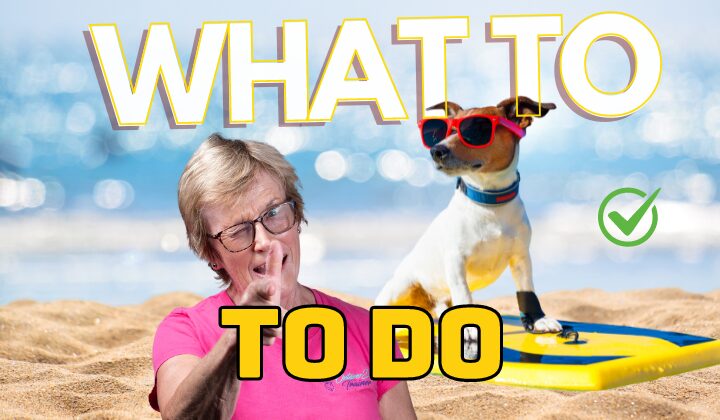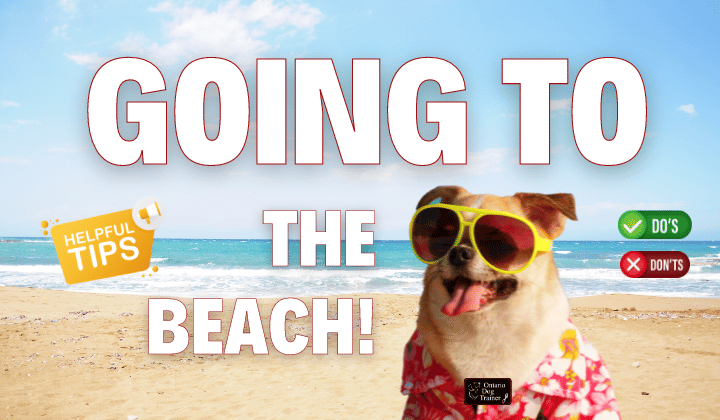Dog Beach Etiquette: Tips to Ensure Your Dogs Remain Welcome on the Beach
Hey there,
Have you ever taken your dog to the beach? It’s such a fantastic place for dogs to run, play, and explore. I recently went on an RV road trip with my dog, Pippy the Papillon, and we hit up some beautiful beaches in Prince Edward Island (PEI) and Cape Breton, Canada. Let me tell you, walking freely with Pippy on those sandy shores was pure bliss. But I also noticed how important it is for us dog owners to be responsible so we can keep enjoying these privileges. So, I thought I’d share some tips on what to do—and what not to do—when you take your dog to the beach.
The Importance of Dog Beach Etiquette
Okay, let’s get real for a second. Beach access for dogs is a privilege, not a right. That means it’s up to us to show we’re responsible enough to keep it. The beach is a fantastic place to run, play, and explore with your dog. During my recent RV road trip, I encountered campgrounds where dogs were not permitted on the beach and others that allowed dogs.
During my time at Twin Shores Campground in Darnley, PEI, I saw firsthand how well dogs and beachgoers can coexist when everyone follows the rules.
I became acutely aware of the privilege and therapeutic benefits of walking freely with Pippy on the beach. I frequently witnessed the responsible behaviour and courtesy of other people enjoying their dogs on the beach, which made it easy for everyone to enjoy the beach without incident.
Trust me, it’s possible! Let’s dive into how we can all make the beach a happy place for our pups and fellow humans. Here are five important tips on what to do with your dog at the beach, and five key things to avoid.

Five Things to Do with Your Dog on the Beach
1. Keep Your Dog on a Leash (Unless in a Designated Off-Leash Area)
-
- Always adhere to local regulations regarding leashes. Even if your dog is well-behaved, other beachgoers might be uncomfortable around unleashed dogs. A leash on your dog improves your ability to keep your dog under control and avoids potential conflicts.
- A long line of 10 to 15 feet can be an alternative to a regular six-foot leash, giving your dog more freedom to explore. When you see other dogs and people approaching, give them a wide berth and keep moving to create distance between you and the approaching dog. When you continue walking, your dog will follow you rather than focus on the other dog. Even though walking on a long line offers more freedom for your dog to explore, avoid infringing on the privacy of other beachgoers
Related: Three tips to make walking your dog so much easier … and safer too!
2. Pick Up After Your Dog
-
- This should be a no-brainer, but it still needs to be said.
- Always carry poop bags and promptly clean up after your dog. Leaving waste on the beach is not only unsightly but also unsanitary and can lead to stricter regulations against dogs.
- Here is another no-brainer – after ‘scooping the poop’, dispose of the bag in a designated bin OFF the beach. Don’t leave poop-filled bags on the beach or at the entrance to the beach.
3. Bring Fresh Water and a Bowl
-
- Saltwater is not safe for dogs to drink, and running on the beach can quickly lead to dehydration.
- Bring fresh water and a portable bowl to keep your dog hydrated. It’s such a simple thing, but it makes a big difference in keeping your pup healthy and happy
Related: Top Tips to Beat the Heat: Heat Safety for Dogs in the Summer
4. Provide Shade and Rest
-
- Beaches can get incredibly hot, and dogs can overheat quickly. Bring a beach umbrella or a pop-up tent to provide some shade. Ensure your dog has a comfortable and cool place to rest away from the sun’s direct heat.
- If you are packing for the day, bring your dog’s cooling pad for a clean, cool and relaxing spot for them to ‘chill’.
5. Monitor Your Dog’s Behaviour
-
- Keep an eye on your dog at all times.
- You want to make sure they’re not bothering wildlife, annoying other beachgoers, or getting into dangerous situations.
- Active supervision can prevent a lot of problems before they start and helps keep the beach enjoyable for everyone.
Now that we’ve covered the must-dos for a fun and safe beach day with your dog, it’s equally important to be aware of what not to do in dog beach etiquette. Avoiding these common mistakes will help ensure that everyone, including your pup, has a great time at the beach. So, let’s dive into the things you should steer clear of when bringing your dog to the beach.

Five Things to Avoid with Your Dog on the Beach
1. Do Not Allow Your Dog to Approach Others Without Permission
-
- That is basic dog beach etiquette.
- Not everyone is comfortable around dogs, and some might even have allergies or fears. Always ask for permission before allowing your dog to approach strangers or other dogs.
- Many dogs can react to strangers charging into their space. When you want to allow people to pet your dog, give instructions on how to proceed (e.g., wait for the dog to be calm; don’t reach over the dog’s head, remain silent, and any nuances that are specific to your dog);
- Only allow your dog to approach when it’s calm.
Related: How to Stop your Dog from Jumping on People
2. Avoid Letting Your Dog Chase Wildlife
-
- Beaches are home to all sorts of wildlife, some of which might be endangered. Letting your dog chase birds or other animals can be harmful and disrupt the local ecosystem.
- Teaching your dog the “place command” is vital in these situations. It helps keep your dog focused and calm, preventing them from chasing after wildlife.
- Keep your dog’s curiosity in check and focus on more appropriate ways for them to play and explore.
Related: Teach your dog the PLACE command
3. Do Not Ignore Aggressive or Anxious Behavior
-
- If your dog shows signs of aggression, stress or anxiety, it’s best to remove them from the situation. An uncomfortable dog can lead to dangerous encounters.
- It’s crucial to be aware of your dog’s communications, and to respect their limits and those of others around you.
4. Avoid Feeding Your Dog on the Beach
-
- Human food, especially in the form of beach snacks, can be harmful to dogs. Feeding human food to your dog anywhere, including on the beach can create undesirable habits and also attract unwanted attention from other dogs and wildlife.
- Stick to feeding treats for good behaviour and full meals at home or in designated areas.
5. Do Not Leave Your Dog Unattended
-
- Leaving your dog alone on the beach is irresponsible and potentially dangerous. They could wander off, get into hazardous situations, or disturb others.
- Always keep your dog within sight and under control.
- Again, dog beach etiquette!
FAQs: Common Questions About Taking Your Dog to the Beach
Can I let my dog off-leash on the beach?
It depends on the beach’s regulations. Always check local rules regarding leashes. Some beaches have designated off-leash areas, but in most cases, keeping your dog on a leash is required to ensure everyone’s safety and comfort.
What should I do if my dog eats sand or drinks saltwater?
- Eating sand can cause gastrointestinal blockages, and drinking saltwater can lead to salt poisoning. If your dog ingests sand or saltwater, monitor them closely and provide plenty of fresh water. Contact your veterinarian if they show signs of distress, such as vomiting, diarrhea, or lethargy.
How can I keep my dog cool on a hot beach day?
- Provide shade with a beach umbrella or pop-up tent and bring a cooling pad for your dog to lie on. Ensure they have access to fresh water and take breaks in the shade. Avoid the hottest parts of the day and consider a cooling vest for additional comfort.
Is it okay to bring toys for my dog to play with on the beach?
- Yes, bringing toys can be a great way to keep your dog entertained. However, be mindful of other beachgoers and avoid throwing toys near them. Always supervise your dog during playtime to ensure their safety and prevent any disturbances.
What should I do if my dog is scared of the water?
- Gradually introduce your dog to the water at their own pace. Start with shallow areas and encourage them with positive reinforcement and treats. Never force your dog into the water. Some dogs may never enjoy swimming, and that’s okay.
Can I bring my puppy to the beach?
- Yes, but ensure your puppy is fully vaccinated and comfortable in new environments. Keep them on a leash and supervise them closely. Puppies can tire easily, so provide plenty of breaks and fresh water to keep them hydrated.
The Ultimate Message: Beach Access with Your Dog is a Privilege!

Dogs bring joy and energy to the beach, but it’s the owners like you that ultimately determine whether they are welcome. Practicing proper beach etiquette with you dog is essential so everyone can continue to enjoy these beautiful spaces. By following these do’s and don’ts, we can demonstrate that dog owners are responsible and considerate, preserving beach access for everyone’s enjoyment.
Remember, a little consideration goes a long way. Share your adventures on the beach with your dog. Let’s work together to protect our beach privileges and ensure that dogs can continue to be a part of our seaside adventures.
Pet Friendly Ontario Parks
If you plan to camp with your dog in an Ontario Provincial Park, check out this link for dog friendly beaches in provincial parks.
Need Dog Training Help?
Please fill out my assessment form. Whether it’s online or face-to-face, let’s get your dog’s behavior sorted.
Want Online Sessions?
Want online dog training from the comfort of your home? Online sessions are as low as $87 per session! Click here for more information.
Are you a Dog Trainer Looking to Grow Your Dog Training Business?
Book a free call with me. We’ll talk strategy, not magic, to boost your dog training business.


